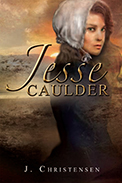
 |
This novel is a testament to how engaging stories of the Old West can be. While revenge, an oft-used staple of the genre, centers the plot, the tale also encompasses survival, empowerment, understanding, and renewal. Fortunately, where morals are concerned, the author lets the story speak for itself, without the need for preaching or pretense. Such restraint increases the book’s impact exponentially.
Jesse is a wife and mother living with her family on a secluded prairie farm sometime after the Civil War. One evening five men stop by to ostensibly water their horses. Jesse expands the supper she’s fixing to include the travelers. After partaking of the family’s hospitality, the men attack without warning. In a savage rush of violence, Jesse’s son, husband, and grandfather are killed. She is brutally raped and left for dead. But she does not die. She survives the horror and eventually begins a quest to track down each of the individuals responsible.
Despite its priniciple storyline, this is not merely a novel of retribution. Additional subplots and characters are added that expand both Jesse’s and the readers’ insights into the subjugation of women, the plight of abused children, and the obstacles inherent in restarting a shattered life. The author achieves all of the above without slighting suspense, drama, or reality. The violent scenes are gripping. Human behavior and interaction are believable. The dialect of the locale and era is perfectly captured in precise speech patterns. Depictions of the physical environment are vivid. Both the story and characters are memorable, not the least of which is a mule named Frank. This is the genre at its best, a western that reminds you why you like westerns.
RECOMMENDED by the US Review